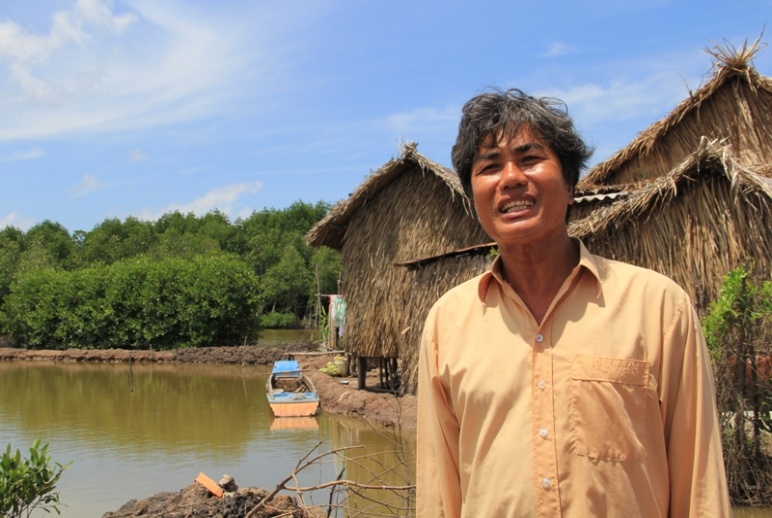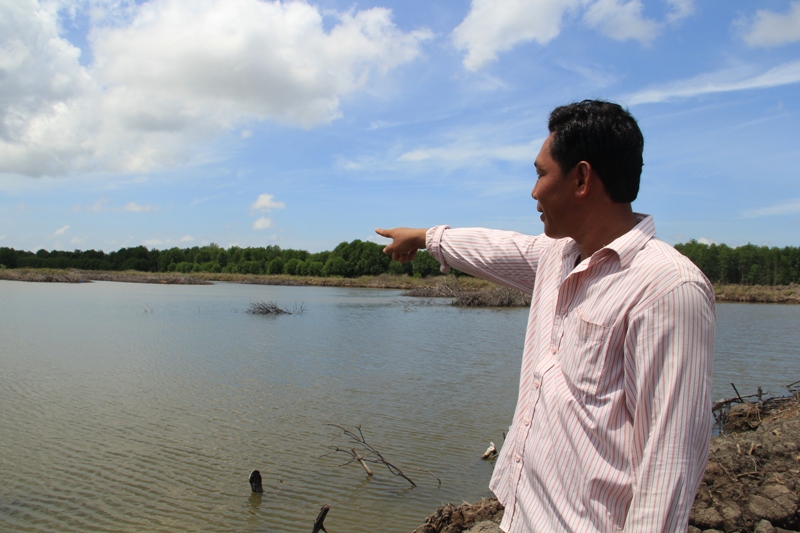Ca Mau is the southernmost province of Viet Nam, surrounded on three sides by sea. One of the main forest owners in the province is Nhung Mien Forest Management Board (FMB). Under Vietnamese law, FMBs are bodies established by the government to administer areas of land, which are legally defined to be “forest land”, irrespective of whether there are trees growing on the land. In the case of Nhung Mien FMB, its role is to protect and manage about 12,600 ha of forest land in 14 villages of Vien An Dong commune. Approximately 40% of this area is actually forested (around 5,400 ha), consisting of mangroves planted for protection (43%) and production (57%) purposes.
During July – September 2015, with technical and financial support from the Viet Nam UN-REDD Phase II Programme, the FMB developed a Site REDD+ Implementation Plan (SiRAP) in consultation with local stakeholders. The Plan aimed to address the widespread issues of mangrove conversion and degradation, with illegal conversion to shrimp farms identified as one of the critical drivers of deforestation. The UN-REDD Provincial Programme Management Unit (PPMU) of Ca Mau signed a REDD+ Implementation Agreement (RIA) with the FMB in November 2015 to encourage the FMB to: (i) empower local people to adopt integrated forest-aquaculture management models, including certified organic shrimp farming; and (ii) enhance forest monitoring and strengthen law enforcement.
While other FMBs that are developing SiRAPs are still selecting sites for contracting forest/forest land to interested households, Nhung Mien FMB has already contracted over 10,000 ha of “forest land” (80% of the total area) to about 2,700 households on 20-year terms, renewable subject to good performance and the needs of households. The length of the contracts is unusual in Viet Nam – usually they are much shorter. This reflects the confidence of the FMB and Provincial Peoples’ Committee in the commitment and capacity of the local stakeholders.
In June this year, personnel from the UN-REDD Programme visited two families in Vien An Dong commune, to learn about their lives, and how the Programme was supporting them.
So, late one morning, after a 20-minute trip by boat from the FMB’s office, Nguyen Tuong Hiep, is passionately telling us under a burning sun about his plans to move forward with certified organic farming.
Aged 38, Hiep, a resident of Xuong Tiem village, has many dreams and plans to ensure that he will be able to generate more income to support his family of four, his wife and two children.
The couple has been contracted by Nhung Mien FMB to manage 8.4 hectares of land for an initial period of 20 years.. Of the total area, currently only three hectares are covered by mangroves (36% of the area). The rest was deforested long ago.
Hiep and his wife had heard about certification, and learnt that organically certified shrimp can generate a 15-30% price premium as well as other benefits such as increased productivity and environmental benefits. However, they never believed that they could obtain certification due to many constraints, such as the requirement that at least 60% of their land should be forested, the high technical standards required for certification, and securing sufficient capital for producing shrimp fry or preparing the land for forest plantations and farming.
In July 2015, he joined the first consultation meeting on SiRAP preparation with fellow villagers. The meeting was organized and facilitated by the FMB and THE UN-REDD PROGRAMME, and its purpose was to discuss and explore possible support to enhance villagers’ livelihoods while at the same time increasing forest cover. He learned that the Programme could support him to overcome the challenges he was facing, by designing an organic farming model, providing shrimp fry, and providing training on integrated mangrove-shrimp farming. Furthermore, a government project also committed to provide additional support for mangrove restoration to help him reach the 60% forest cover requirement. Together, these initiatives have made Hiep’s family confident to mobilize additional resources to cover the costs of land preparation and dredging canals.
“We will have a lot of work to do in coming months, for example land clearance in two weeks, attending technical trainings in July, starting mangrove planting in August as more rains come, raising shrimp …” said Hiep
We left this family with great hopes that Hiep’s plan will result in the benefits that the family is dreaming of. We were convinced that the lessons learnt from this SiRAP, especially on integrated approaches to promote certified organic farming, would become a tool for Nhung Mien FMB and others, so that the remaining thousands of households with forest contracts, like Hiep’s, will be more confident in increasing their forest cover, and simultaneously enhancing their livelihoods. We are also encouraged to think that all this was contributing to Viet Nam’s efforts to reduce greenhouse gas emissions through its National REDD+ Action Programme.

Next, we visited Dam Phan Dinh, 51, and his wife, Vo Thi Kim Loan, 44, who live with their two children in Muong Tien village. Dinh’s family has a contract with Nhung Mien FMB to manage an area of 3.5 hectares under a 20-year contract. Currently only 20 % of the area is forested. Dinh is committed to forest conservation, emphasizing when asked about illegal logging in his area that:
“No outsider is allowed to cut a single tree here as it is my family’s mangrove, and it is our major source of income”.
So far, his family has been practicing traditional shrimp farming with a revenue of about VND 4 million (about USD160) per month. Subtracting the cost of shrimp fry (VND 2 million/month), and all their other costs, their net monthly income is very low.
Dinh understands very well that he would be able to expand his business and gain a higher income if his shrimp farm were to be certified as organic. However, in contrast to Hiep, Dinh faces much greater challenges since his current forest cover is so low. He needs additional support and incentives to be able to obtain certification.
During a meeting in July 2015 about incentives provided by the UN-REDD Phase II Programme in Viet Nam, Dinh commented:
“I know that the Programme is ready to provide some support on seedling and organic farming techniques but we are still not confident to proceed as we face a serious lack of investment for land preparation for mangrove plantation.”
Responding to such comments, the UN-REDD Phase II Programme plans to launch a revolving fund in July 2016, as a part of Nhung Mien FMB’s SiRAP. This is viewed as another innovative solution for Dinh’s family and many others in increasing forest cover across the FMB, while assisting the farmers to increase their incomes. The impact of the revolving fund will be monitored closely to extract lessons that can be applied elsewhere.
Read more about the UN-REDD Programme's work in Viet Nam here.
